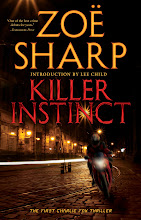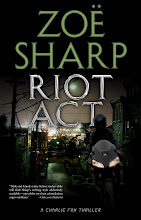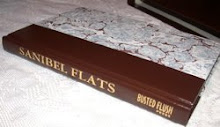 The Tower Interviews by Craig McDonald
The Tower Interviews by Craig McDonaldIn September 2009, Busted Flush Press will publish Tower (978-1-935415-07-7; trade paperback original; $15), a collaboration between award-wining crime novelists Ken Bruen (London Boulevard; Once Were Cops; The Guards) and Reed Farrel Coleman (Walking the Perfect Square; The James Deans; Soul Patch). Tower was edited by Edgar Award-nominated crime writer, editor and literary agent, Allan Guthrie (Kiss Her Goodbye; Two-Way Split; Slammer). In the following interview, the trio discusses the process of writing and editing a novel that Publishers Weekly calls "brutally poetic."
Edgar Award-nominated crime writer Craig McDonald (Head Games; Toros and Torsos) interviewed Bruen, Coleman, and Guthrie. Craig ("a genuine expert on the history of crime fiction" — Eddie Muller, San Francisco Chronicle) is an accomplished interviewer, and two collections of his interviews with major crime writers have been published: Art in the Blood (PointBlank Press) & Rogue Males (Bleak House Books; May 2009). Here is the second interview, with two-time Edgar Award nominee Reed Farrel Coleman! [Interview #1, with Ken Bruen, can be found here.]
REED FARREL COLEMAN
Craig McDonald: The way it was explained to me, you were presented with Ken’s fragment, and essentially had to drive it home. What was your strategy for advancing the narrative and making it whole?
Reed Farrel Coleman: It was the hardest and, in many ways, the most rewarding work I’ve ever done. I had to develop the strategy as I went. Ken takes no credit for this, but the fact is that he left room to breathe in his half of the narrative. This allowed me the space to develop the storyline and to bring both lead characters to life. It also let me bring the book to a crescendo. If he had written his narrative more densely, it would have left me nowhere to go. As written, Tower builds (sorry about the bad pun) to, what I think, is a powerful and emotionally satisfying ending.
CM: One of the appeals of fiction writing is that autonomy and freedom to build worlds, set atmosphere, plot and to define character. Was collaboration at all confining for you in any of those areas?
RFC: It’s difficult to separate this answer from the first answer, but I’ll try. I tell my students that to be a writer you need to develop an incredibly strong and healthy ego. Not a big ego, a strong one. When you really think about it, the notion that someone is going to shell out fifteen or twenty-five bucks to buy a bunch of words that you strung together is pretty ballsy. In order to be a good collaborator, one needs an especially strong ego because you have to both subvert it and rely more heavily on it. To work with Ken I was willing and able to do that.
Wordsworth wrote a sonnet that I often refer to entitled “Nuns Fret Not.” The sonnet is a very strictly defined form and the life of a nun has many strictures. Wordsworth’s point is that even with severe constraints a person can achieve much satisfaction. So it was with Tower. That I had to write characters that weren’t my own invention within a structure that was not my own and according to a timeline that had already been laid out for me was nearly impossible. However, it drove me to do things and reach for strengths I never knew I possessed both as a writer and a person. I am a far better writer for having even tried it.
CM: What particular challenges did you face in writing this book, as opposed to one of your own novels?
RFC: Well, the obvious ones. The characters weren’t my own invention nor was the plot, but that’s not all bad. As a non-outliner, plot develops for me organically. With Tower I was relieved of that gnawing tension that I suffer through with my own novels. The plot was laid out for me. The tough part was making Todd, the character I was responsible for, a reflection of me as an author. This was the brilliance of what Ken did. He gave me an empty vessel into which to pour my vision of Todd. I look at it this way; Ken gave him a name and I gave him a life.
CM: Ken says the “Rashomon” approach of presenting certain events from varying perspectives evolved as you began to expand the work. Was this something you consciously pursued in the early phases?
RFC: I think we need to back up some and get something straight. Doing stuff with Ken isn’t like doing stuff with anyone else. I mean that as an extreme compliment. Ken and I discussed the book in passing, but just like an idea. You know: “Reed, I’ve got this idea for a book. Maybe we could do it together. Here’s what I’m thinking…” Then we didn’t talk about it again for months. One day I get an email and attached is Ken’s half of the book and a prototype book cover he had done with out names on it. The email said something like, “Have at it, buddy!” I mean, that is so Ken. We didn’t really discuss it or plan it. That’s the thing you gotta love about Ken. He can do things like this. He understands challenges and challenging his friends. I took the challenge of Tower as the greatest compliment Ken could give me. He trusted me enough not to screw it up and rise to it. So I guess that’s a roundabout way of saying there wasn’t a lot of preplanning and conceiving here on my end.
CM: What was the most satisfying aspect of this project?
RFC: There are many, but I think the most satisfying will be when I stand up with Ken at the launch party and we read from the book.

CM: Is there anything in the experience you found frustrating?
RFC: In the beginning of the process, there were a million. I’d never taken on anything like this. I really struggled with self-doubt and finding my way ahead. I was frustrated because I couldn’t rely on the old tricks I use with my own stuff. It was like learning a new language all on my own.
CM: How was the editing process in terms of having another writer involved?
RFC: Here’s where Ken really understood the process of collaboration. He had his say, but for the most part trusted me to do the early editing. Then I ran the changes by him and there was very little disagreement if any. We did need an objective eye for the final edits and to make sure we didn’t miss anything because we were so close to the project. This is where Al Guthrie, a splendid writer in his own right, with a sharp editorial eye who knew our work, did a splendid job.
CM: How would you measure the character of Todd against your other series characters?
RFC: I wouldn’t, but for argument’s sake I’ll have a go at it. I went more deeply into Todd’s psyche than I’ve ventured with Dylan Klein or Joe Serpe—the character I write under "Tony Spinosa"—or even Moe Prager. Todd is more violent than any of those characters and has much less impulse control. In fact, loss of control and trying to regain it is the central drive in Todd’s life. That’s the note I hit on because it was a reflection of the task set before me by Ken. How could I regain a sense of control in a book that wasn’t mine to begin with. I realized it only in retrospect.
CM: Have you read the Bruen/Starr collaborations? If so, was there anything you consciously did to avoid comparison with those books?
RFC: I’ve read them, yes, though I’m partial to Bust, which was, in part, dedicated to me—Thank you, boys. And being privy to Jason and Ken’s process for their books helped a lot with Tower. All collaborations are different and neither Ken nor I was interested in trying to repeat what he and Jason had accomplished. From the start, the tone was diametrically opposed to the satirical, winking pose Jason and Ken take for their books. Tower is many things, but funny isn’t one of them.
CM: Tower bears the Bruen convention of heading chapters with quotes from other works. Did you choose your own quotes, or was that style point something overlaid by Ken?
RFC: I enjoy the thing Ken does with the quotes because I learn from them and they, like a prologue for an entire book, help set the tone of the chapter. I used my own quotes and hope they are more in line with the character of Todd as the quotes Ken used are more in line with Nicky. It was great to break out of my own stylistic constraints and try on some different clothing. I’ve always been good at imitating voices and this was a way to do it in writing.
CM: My understanding is that the prologue and epilogue are yours. What inspired this framing decision?
RFC: Pragmatism, plain and simple. When both of our narratives were done, the book still wasn’t of a piece. It wasn’t complete. We both saw that and some of our early readers agreed. So I tried several different prologues—to go back to the question about frustrations, this was the biggest one I had—and, after what felt like a million tries, I hit upon the solution. Ran it by Ken and he loved it. Still, we needed something contextual to round it out. The prologue had created a different kind of imbalance. Prologues and epilogues are more my style than Ken’s, but he let me try an epilogue. I don’t know where I pulled that one out of, but the introduction of a third narrative voice just seemed right. Part of being an artist is knowing when you’re not done and when you’re done. When we took a look at the book with both prologue and epilogue included, we knew it was done.
CM: Was there any disappointment arising from the fact the novel kept you in your NYC setting? Did you wish you’d had another shot at writing Ireland, à la Dublin Noir?
RFC: To tell you the truth, I couldn’t have taken any more challenges with this book. If I had to imagine our characters in another setting, I would have gone completely out my mind. Maybe somewhere down the road, Ken and I can do something set in a different place.
CM: Have Ken and you discussed how you might divide eventual awards/Edgar® statuettes?
RFC: I think we’ll worry about that if and when we get there. Ken and I are both two-time Edgar losers and I don’t think tempting the gods is going to help any.
CM: What are your thoughts on the state of the genre presently?
RFC: I think the genre is indestructible: good times or bad. I believe that. As to the state of the industry… I think they have to look back at what befell the music industry and make some hard decisions. The music industry, as those of us older than forty understood it, no longer exists. It’s a shell of what it was and I would hate for that to happen to publishing. But I would hope that publishers would include the suppliers of their product—writers and agents—in their considerations of how to move ahead. The Kindle is a good idea, but it’s way too expensive to have a huge impact. If the price comes down or if it’s simply given away with the reader guaranteeing to purchase X amount of books, it could be huge. What do I know, I’m just an author?
CM: What’s next for you?
RFC: I’m working on a new book with a new protagonist, but I don’t want to give too much away. I’ve also been working on a very complex novel for many years. It has so many moving parts that I need to step away from it for long periods of time in order to refine it. But I never know exactly what’s next.
CM: Anything you’d like to add?
RFC: I’d like to thank David Thompson for believing in us and for being a publisher on the rise. With the industry in the state it’s in, Busted Flush Press is well-positioned to give a home to great authors and to keep careers alive and flourishing.
---------------------------------------
Look for the 3rd interview (with editor/crime writer Allan Guthrie) to run soon, along with an excerpt and more! Tower will be published in September 2009. Ken Bruen & Reed Farrel Coleman will both appear at Bouchercon in Indianapolis! Booksellers / librarians: Order Tower through Consortium Book Sales & Distribution, Ingram, and Baker & Taylor!




































.jpg)

